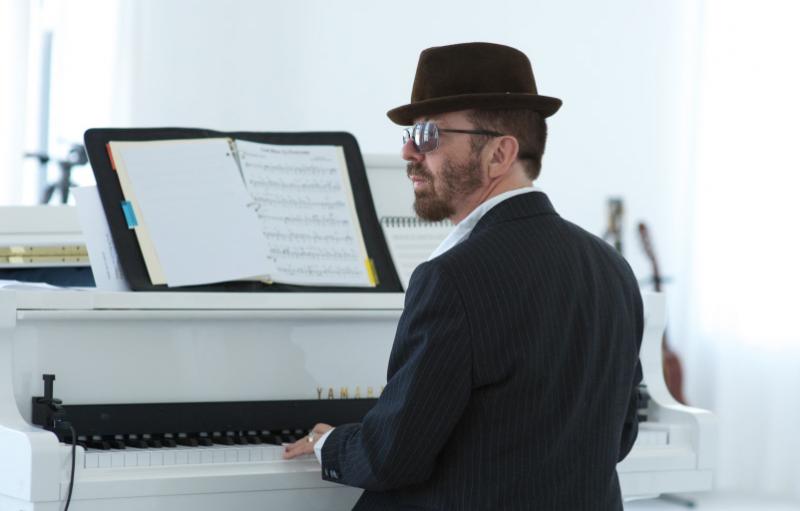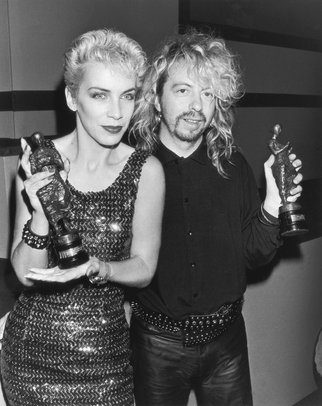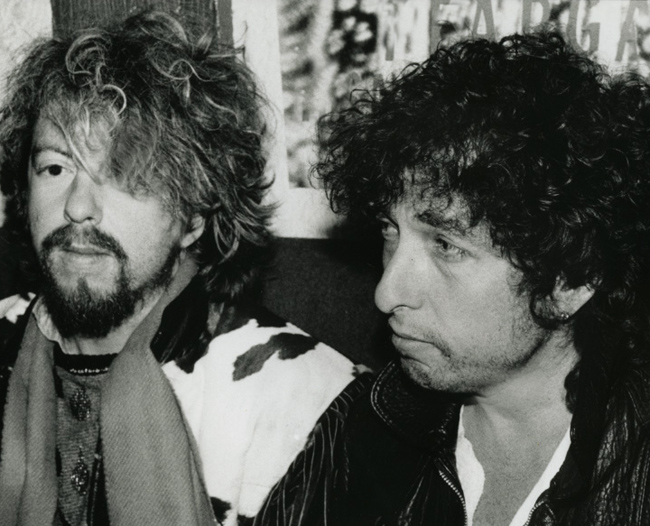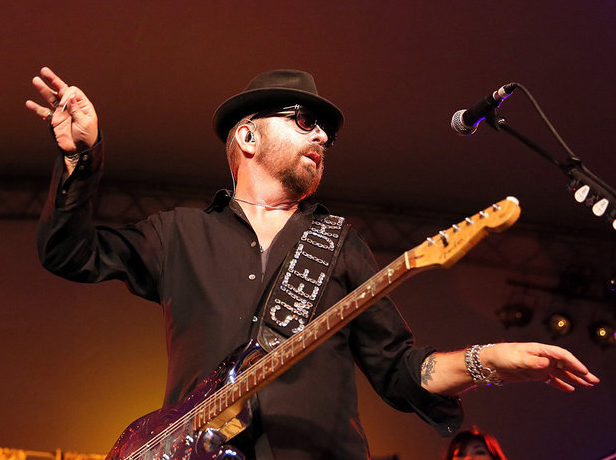Interview: 10 Questions for Dave Stewart | reviews, news & interviews
Interview: 10 Questions for Dave Stewart
Interview: 10 Questions for Dave Stewart
The former Eurythmic has recorded a double-quick album in Nashville, and filmed it

Sunderland-born Dave Stewart has embraced the life of a wandering troubadour virtually since he was born. He had a record deal with folk-rockers Longdancer at the start of the Seventies, though he didn't start to enjoy commercial success until the end of the decade, when he was with The Tourists. They're possibly best remembered for their cover of the Dusty Springfield hit "I Only Want To Be With You", but more importantly, it was the band which brought Stewart together with Annie Lennox.
As Eurythmics, Stewart and Lennox became one of the Eighties' biggest acts, engulfing the planet with a stream of hits including "Sweet Dreams (Are Made of This)", "Who's That Girl", "Would I Lie To You" and many more, with blockbuster albums to match. Since the duo dissolved in 1990, Stewart has kept busy with a broad variety of projects. He has worked as a producer with Tom Petty, Mick Jagger, Bryan Ferry and Stevie Nicks, he has made solo albums, and was one of the guiding lights behind the 46664 campaign endorsed by Nelson Mandela, in which a roll-call of megastars battled HIV/Aids in South Africa (Stewart and Lennox collect yet more Eurythmics gongs, pictured below).
 His latest of project is the documentary film Dave Stewart: The Ringmaster General, a hectic account of how Stewart recorded a brace of albums in Nashville in a few days, seemingly by making up a whole bunch of songs on the spot. Broadcast tonight on Sky Arts 1 at 10pm, it all began (allegedly) when he found himself stranded in London thanks to the volcanic cloud from Iceland, where he discovered an old guitar that used to belong to country musician Red River Dave in a Tin Pan Alley music shop. Stewart heard Nashville calling him...
His latest of project is the documentary film Dave Stewart: The Ringmaster General, a hectic account of how Stewart recorded a brace of albums in Nashville in a few days, seemingly by making up a whole bunch of songs on the spot. Broadcast tonight on Sky Arts 1 at 10pm, it all began (allegedly) when he found himself stranded in London thanks to the volcanic cloud from Iceland, where he discovered an old guitar that used to belong to country musician Red River Dave in a Tin Pan Alley music shop. Stewart heard Nashville calling him...
ADAM SWEETING: In the film, at least, you look as though you've hardly aged. How have you managed that?
DAVE STEWART: I dunno. You can probably see by the movie that I enjoy what I'm doing. I think a lot of the thing about ageing is often to do with not enjoying what you're doing.
The film looks as though it was made haphazardly, but it must have been planned?
It's funny. This is the same thing going all the way back to the Eurythmics, but for some reason I seem to attract chaos, or maybe it's that I allow it to happen, and then while it's happening I somehow manage to steer the chaos towards something, towards a goal, but I don't stop the chaos happening. A lot of people in that environment, like in the movie where I've got all those people coming in and out and writing songs in that short amount of time, and then deciding to do a gig and ringing the Nashville radio station at the last minute... a lot of artists would be fearful of that. They'd want everything to be much more perfect and understand every single thing that's going on. For a start they'd want to know that the songs were all written before they went in, or they'd made the demos of the songs, or had actually worked with some of the musicians before. But I actually just like jumping in the deep end.
Do you do that with live performances too?
 I just played at the Voodoo Festival in New Orleans, and I had some different players come and join me, and at the last minute I invited the Soul Rebels Brass Band onstage with us - they're a New Orleans brass band. I ended up conducting them playing a brass arrangement of "Sweet Dreams", but we'd never rehearsed it. We couldn't because it was a festival, we just had to talk about it in my bus and on acoustic guitar sort of figure something out. I like all that, and I liked it in Eurythmics. That was a mix of two really different characters. Annie [Lennox] does like everything really sort of worked out and nailed down, but then I always had this other element of saying that maybe we should go this way, you know? And Annie liked that too. It was more experimental.
I just played at the Voodoo Festival in New Orleans, and I had some different players come and join me, and at the last minute I invited the Soul Rebels Brass Band onstage with us - they're a New Orleans brass band. I ended up conducting them playing a brass arrangement of "Sweet Dreams", but we'd never rehearsed it. We couldn't because it was a festival, we just had to talk about it in my bus and on acoustic guitar sort of figure something out. I like all that, and I liked it in Eurythmics. That was a mix of two really different characters. Annie [Lennox] does like everything really sort of worked out and nailed down, but then I always had this other element of saying that maybe we should go this way, you know? And Annie liked that too. It was more experimental.
Did you learn much from working with Bob Dylan (pictured above with Stewart)? Because he has that very spontaneous approach too.
Yeah, I think there's a few people who work in that way. Van Morrison used to... the musicians didn't know what he was going to play, he'd go in the studio and he wouldn't tell them how long the song was and all this. But with me, a lot of it is that I don't want to know the outcome myself. I want to find out what the outcome is. On this particular project it was kind of interesting because the outcome ended up being a film as well, y'know. Two albums and a film all because of this mad Icelandic volcano and being redirected and all this stuff. In the movie you see that happening, and you see me having to recreate some scenes which were actually happening, like my management going, "Where the hell is he and what's happened?" I had to recreate that in retrospect, but it was recreating what was really happening, like a dramatisation of what happened.
What cameras did you use to shoot it?
It's a mixture, depending on what was happening and where I was. Sometimes it was literally two Flip cameras balanced on a chair and on the sideboard. Then the Canon 5D became the camera that we used a lot in the studio, because they can work in low light really good and they're very high quality. Years ago [film director] Mike Figgis taught me a great trick, which was basically just put a little recorder in the pockets of your actors, and you can shoot them from 200 feet away or whatever with a long lens, and you get this really amazing quality recording of them talking. Then you just marry it up later in the edit, instead of trying to get guys out of shot who have got boom mikes and all this stuff. We did a bit of that.
We see you writing the song "Cheaper Than Free" with Stevie Nicks. How did that process start?
You see the scene in the movie with Reese Witherspoon. Stevie is saying, "I'm going to Nashville for the first time, where shall I stay?" and Reese says, "Why don't you stay at my condo in Nashville", and Stevie says, "Yeah that would be cheap", in a kind of jokey way, and Reese says, "Well, what's cheaper than free?" I thought that would be an idea for a song. Stevie was going to finish the words off and I wrote the melody and recorded it. By that time Stevie was in LA and I was in Nashville in the middle of the chaos. I rang her up and said, "Have you finished those words?" and she sent them, I sat down at the mike with my guitar and sang it once. We sent it straight back to Stevie and she was amazed that literally an hour later it came back. It had a bit of pedal steel and some other things on it.
New technology has reduced my royalties by about 1000 percent, but it's also given me the freedom to createIs Stevie an old friend of yours?
Yeah. I met her in about 1982, I think. I was writing a song for her called "Don't Come Around Here No More" but I actually ended up finishing it with Tom Petty, and Tom said he wanted to record it. Because the last time this happened was with a song called "Stop Draggin' My Heart Around", and [producer] Jimmy Iovine then put it on Stevie's album which really affected the progress of Tom's album. So when Tom heard "Don't Come Around...." was going to be for Stevie on her album and Jimmy was going to produce it with me, he said, "Hey, hang on a minute, I'm going to put this on my record." Of course he did it and it became a huge hit. But Stevie and I became friends around then.
What has new technology done for your career?
Basically it's done two things in two opposite directions. It's reduced my royalties by about 1000 percent, but it's also given me the freedom to create other possibilities and other worlds and connect with people that I never would have connected with, like Diane Birch or whoever... it's a million things, I can't even explain how many things it's helped me to create and make. But in the music business world they're still really struggling with how to repair the monetisation of the actual simple thing of selling music. I don't think that'll ever get fixed, not in the way that we know it. When people make a record, even my one in Nashville, you see I'm in a proper studio and these are great musicians and they're all Nashville musicians and on union scale, and there are certain costs that go with making music. Yeah, you can make it in your bedroom with your laptop, but if you want to record drums and pedal steel guitar or an orchestra, it's pretty difficult. There are huge costs associated with it which you try to minimise.
 So what can you do about it?
So what can you do about it?
A lot of bands and artists have to reinvent themselves. There are acts like Adele that have such a wave of enthusiasm going towards them that they can sell in the way that artists used to sell years ago, but the general 99 percent of artists have got to invent new ways in which to tackle getting their music across. Obviously YouTube and Facebook and all the new things help, but a lot of artists aren't interested in technology and that kind of stuff. I use it to keep in touch with all sorts of new acts, artists coming up. I first heard of this kid Jake Bugg a year and a half ago and I tried to get in contact with him, cos I thought he was amazing and he had 50 views on a YouTube video. I was trying to get him to come to Nashville and I would have made a recording with him, but lots of other people saw it and he very quickly got signed. Now he's got an album out and he's been top of the charts.
When you look at the 1980s and the mega-success of Eurythmics, how do you think about that period now?
That whole period? Well, I suppose us along with a few bands at the time we experienced that real sort of rocketing fame in a global way. For Annie and I it wasn't that we just took off in England, it was like we took off in England, Sweden, America, Australia, Germany... we had the same chart positions in just about every country, so we spent a lot of the time on tour round the world. We toured literally constantly for about eight and a half years and in that period we made nine albums as well, so I don't know how the hell we did it. Well, this film shows you how the hell we did it, because we would go into the studio and just make up songs and record a whole album in two weeks, give it to the record label and go back on tour. Most bands would make an album every three years so they'd make three in nine years.
- Dave Stewart: The Ringmaster General is on Sky Arts 1 at 10pm tonight
The future of Arts Journalism
You can stop theartsdesk.com closing!
We urgently need financing to survive. Our fundraising drive has thus far raised £49,000 but we need to reach £100,000 or we will be forced to close. Please contribute here: https://gofund.me/c3f6033d
And if you can forward this information to anyone who might assist, we’d be grateful.

Subscribe to theartsdesk.com
Thank you for continuing to read our work on theartsdesk.com. For unlimited access to every article in its entirety, including our archive of more than 15,000 pieces, we're asking for £5 per month or £40 per year. We feel it's a very good deal, and hope you do too.
To take a subscription now simply click here.
And if you're looking for that extra gift for a friend or family member, why not treat them to a theartsdesk.com gift subscription?
more New music
 Album: Reneé Rapp - Bite Me
Second album from a rising US star is a feast of varied, fruity, forthright pop
Album: Reneé Rapp - Bite Me
Second album from a rising US star is a feast of varied, fruity, forthright pop
 Album: Cian Ducrot - Little Dreaming
Second album for the Irish singer aims for mega mainstream, ends up confused
Album: Cian Ducrot - Little Dreaming
Second album for the Irish singer aims for mega mainstream, ends up confused
 Album: Bonniesongs - Strangest Feeling
Intriguing blend of the abstract, folkiness, grunge and shoegazing from Sydney
Album: Bonniesongs - Strangest Feeling
Intriguing blend of the abstract, folkiness, grunge and shoegazing from Sydney
 Album: Debby Friday - The Starrr of the Queen of Life
Second from Canadian electronic artist and singer offers likeable, varied EDM
Album: Debby Friday - The Starrr of the Queen of Life
Second from Canadian electronic artist and singer offers likeable, varied EDM
 Music Reissues Weekly: The Pale Fountains - The Complete Virgin Years
Liverpool-born, auteur-driven Eighties pop which still sounds fresh
Music Reissues Weekly: The Pale Fountains - The Complete Virgin Years
Liverpool-born, auteur-driven Eighties pop which still sounds fresh
 Album: Indigo de Souza - Precipice
US singer's fourth ups the pop ante but doesn't sacrifice lyrical substance
Album: Indigo de Souza - Precipice
US singer's fourth ups the pop ante but doesn't sacrifice lyrical substance
 Album: Mádé Kuti - Chapter 1: Where Does Happiness Come From?
Lively new album from the third generation of Nigeria's first musical family
Album: Mádé Kuti - Chapter 1: Where Does Happiness Come From?
Lively new album from the third generation of Nigeria's first musical family
 The Human League/Marc Almond/Toyah, Brighton Beach review - affable 1980s-themed seaside package
Retro pop extravaganza bolstered by a (mostly) balmy evening
The Human League/Marc Almond/Toyah, Brighton Beach review - affable 1980s-themed seaside package
Retro pop extravaganza bolstered by a (mostly) balmy evening
 Album: Alice Cooper - The Revenge of Alice Cooper
The original Alice Cooper band are back to fly the flag for all the weirdos
Album: Alice Cooper - The Revenge of Alice Cooper
The original Alice Cooper band are back to fly the flag for all the weirdos
 Album: Paul Weller - Find El Dorado
Inspiring curation of some pretty great covers, and hints of majesty
Album: Paul Weller - Find El Dorado
Inspiring curation of some pretty great covers, and hints of majesty
 Album: Spafford Campbell - Tomorrow Held
The young duo extend folk’s boundaries into an expansive contemporary chamber music
Album: Spafford Campbell - Tomorrow Held
The young duo extend folk’s boundaries into an expansive contemporary chamber music
 Music Reissues Weekly: Mike Taylor - Pendulum, Trio
The return of two idiosyncratic, uncompromising Sixties British jazz rarities
Music Reissues Weekly: Mike Taylor - Pendulum, Trio
The return of two idiosyncratic, uncompromising Sixties British jazz rarities

Add comment